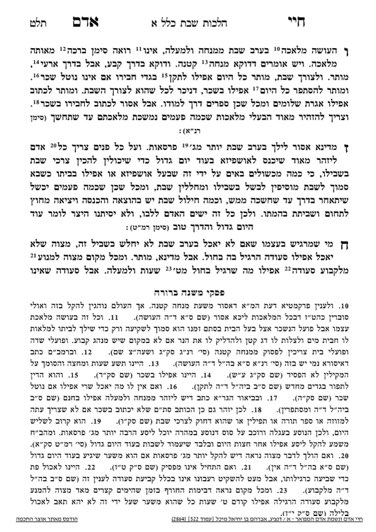We are continuing in siman 8, discussing entering into the Shabbos meals l’teiavon, with an appetite. We learned that a seudas mitzvah which cannot be pushed off, such as the seuda of a bris milah or pidyon haben, can take place on erev Shabbos, because it is a seudas mitzvah.
The Chayei Adam writes that even though such a seudas mitzvah is muttar, it is appropriate to make the seudah earlier in the day, so that the participants will eat their seudas Shabbos with an appetite.
Another application of this halacha is the Purim seudah when Purim falls out of erev Shabbos. In siman 695, we see that the poskim suggest moving the seudah to earlier in the day in order to enter Shabbos with an appetite. Regarding Purim, there is an approach in which one can make their seudah later in the day and continue it into Shabbos. Although some poskim suggest it, it is complicated, and one should ask their posek before practicing it.
A few more points of clarification:
The Chayei Adam mentioned that a seudas mitzvah which can take place on erev Shabbos would include a pidyon haben, even if the pidyon haben was not bizmano (at the proper time, but rather pushed off). The Mishnah Berurah paskens this way as well.
Regarding a siyum on learning, if one has a regular learning schedule, and erev Shabbos comes out to the be the day they finished the masechta, it is preferable in halacha to make a siyum as close as possible to the moment when a person finished the actual learning. Therefore, the Biur Halacha paskens that one may make a suyim for learning, and have a larger than normal meal, even on erev Shabbos. As we learned above, it is preferable to make it earlier in the day but not required.
In siman 249, the Biur Halacha discusses a case in which a person is of delicate constitution, and cannot eat more than one large seudah per day. If there is a seudas mitzvah on erev Shabbos, the question is whether they should eat from the seudas mitzvah, or wait until the seudas Shabbos. The level of chiyuv of the seudas bris or seudas pidyon haben is not the same as the seudas Shabbos. The Chayei Adam brings a suggestion from the Levush that one should eat from the seudas mitzvah, and then eat their three Shabbos meals all on Shabbos day. The Biur Halacha disagrees, and holds that one should forgo the seudas mitzvah in that case. He explains that the seudas mitzvah and not a chiyuv, but a mitzvah. The only seudah which is a bona fide chiyuv is a wedding seudah.
There is a Pirkei D’Rebbi Eliezer which says that one has a chiyuv to make a seudah on the day that they give their son a bris, and that one who is invited to a bris and does not come deserves to be excommunicated. Nevertheless, Rav Chaim Kanievsky ztl understands that the Pirkei D’Rebbi Eliezer does not mean it is an actual chiyuv, but an appropriate action. Practically, it is not understood to be a bona fide requirement. However, the seudos on Shabbos are a bona fide halachic requirement, and therefore they would take precedence.
The Biur Halacha discusses a case in which one eats a large amount on Shabbos itself not in the context of the meal, and then loses their appetite for the seudah. This question is relevant when one goes to a kiddush and eats a large amount, and then goes home to eat their seudah. We will discuss this case more in the upcoming shiur, be’ezras Hashem.
Summary
A person should eat the Shabbos seudos l’teiavon.
- Therefore, if they have the constitution, it is meritorious to skip a meal on erev Shabbos.
- If they are unable to skip a meal entirely, they should at least refrain from a full seudah in the last quarter of the day.
- It is assur to have a larger than usual meal, unless it is for a time sensitive mitzvah such as a bris or pidyon haben, even if they are not bizmano.
- Another exception is for a siyum for learning, in a scenario where one has a regular learning schedule and finishes the masechta on erev Shabbos.
- Nevertheless, it is preferable to schedule these seudos earlier in the day, in order to avoid causing those who partake of the seudah to lose their appetite for Shabbos.
- If one has to choose between partaking of a seudas mitzvah on erev Shabbos and eating the Shabbos seudos, and they know they do not have the constitution for both, they should skip the seudas mitzvah in order to eat the Shabbos seudah.



